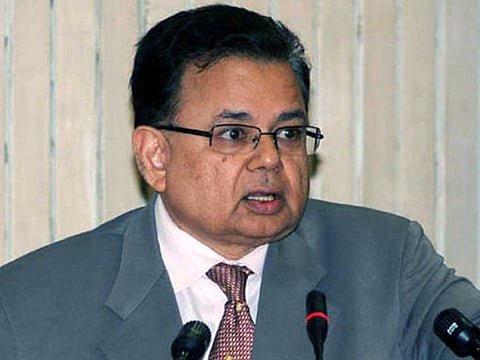UN Security Council needs structural reform
Despite broad-based consensus within member-states, countries need to first agree on the choice of suitable new permanent member-candidates

The November 21 contest at the United Nations in New York for a judge’s seat at the International Court of Justice (ICJ) at The Hague between Sir Christopher Greenwood, a British judge, and his Indian counterpart, Dalveer Bhandari, also drew attention to the long-dragging issue of reforming the antiquated United Nations Security Council (UNSC), a Second World War relic.
In the contest, Bhandari received 183 of 193 votes in the UN General Assembly and secured all the 15 votes in the UNSC. Bhandari, whose victory in the final round was assured after Sir Christopher withdrew his candidacy from the contest, got another nine-year term at the supreme judicial bench. In an earlier round of voting in the UNSC, Bhandari did not get the desired majority, though he commanded a comfortable lead at the General Assembly, where most of the member states abhor the arrogance of power displayed by the veto-wielding five permanent members — China, France, Russia, Britain and United States — the general view is that UNSC’s composition does not reflect today’s realities.
Call it an aberration or a travesty, but not many people even know that one of the ICJ’s top 15 judges has been British since the court’s creation at the end of the Second World War.
Indeed, the Britain-India contest has turned attention to Britain’s membership in the UNSC. It is reminiscent of the closing scene from Jules Verne’s classic Around the World in 80 Days when Princess Aouda, rescued in India by the legendary traveller Phileas Fogg, arrives at the all-male Reform Club in London after Fogg’s successful completion of his laborious world journey, and one of the snobbish club members, horrified at the sight of a woman in the all-male domain, exclaims: “That’s the end of the empire!”
That imaginary scene was played out in Victorian England. Meanwhile, the sun has long set on the British Empire. But then, you might ask, why is Britain still a member of that exclusive club called the Security Council? Why are other equally eligible nations such as India, Germany, Japan and Brazil — the G-4 members — or African countries denied admission to the club to reflect an equitable geographical distribution?
Britain may have had several reasons for abruptly withdrawing Sir Christopher’s candidacy: It may have feared losing support in the UNSC or the contest could have assumed acrimonious traits that could impact bilateral ties with India and harm Britain’s economic interests in India. Britain may have considered that it was not worth damaging her long historical links with India, which will play a leading role within the Commonwealth as Britain’s own role in that motley collection of ex-colonies diminishes.
Britain also, probably, consoled itself that India follows the core concept of the British Common Law, representing values dear to the British.
While the five UNSC members are acutely aware of the growing resentment in the UN General Assembly against their privileged position in the Security Council, the Group of 77 — a coalition of mostly developing nations — applauded India’s victory over Britain, even calling it a G-77 success in pushing back against the five permanent members of the UNSC.
The issue that riles the G-77 is the veto which, many feel, has become a tool for the UNSC members to assert the narrow self-interests of an individual permanent member rather than stop conflict and suffering, and contribute to the betterment of mankind. The existing five permanent UNSC members rely on the disunity among the UN members who, while agreeing on the basic idea of reforming the world body, have not yet determined which countries should be added as new permanent members in an expanded UNSC.
Jeffrey Feltmann, the UN Under-Secretary for Political Affairs, put it succinctly when he told me, in reply to a question during a recent discussion at the Council on Foreign Relations in New York that while the UN Secretariat recognised the fact that the Security Council needs to reflect the 21st-century realities of power structures and demographics, the member states themselves would have to come up with how the Security Council is reformed and then push that momentum.
Feltmann, in a Solomon-like judgement, spoke of some bitter truths: “But what’s happening in practice is the member states themselves are divided on what Security Council reform would look like. Which is great for the P5 [the five permanent members of UNSC], because the P5 can express general support or not for Security Council reform, while knowing they don’t actually have to face it because the member states ... you know, the Africans want a permanent seat. The African group has three (non-permanent) seats now on the Security Council every year. They rotate among the various regions in Africa. But they want a permanent seat. Does that permanent seat go to Egypt? Does it go to South Africa? Does it go to Nigeria? Who gets the permanent seat? The Africans are divided on who they would give it.”
The P5 support for India, which has strong credentials for a permanent seat, has not transcended beyond lip service. This is because India, like other aspirants, faces opposition from one or more UN member-states.
Thus, despite the broad-based consensus within member-states on reforming the Security Council, they need to first agree on the choice of suitable permanent member candidates. Until that happens, the P5 members will remain unperturbed, drawing comfort from the fact that the member-states are a divided lot, incapable of pushing the case for Security Council reform.
Manik Mehta is a New York-based journalist with extensive writing experience on foreign affairs, diplomacy global economics and international trade.



